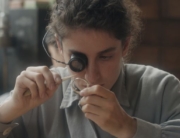The Forgiveness of Blood opens in a rural landscape nestled against the bucolic mountains of Albania. The drivers of a horse cart get out and pick up large rocks blocking a dirt road, and then get back in and plod along. A motor bike jarringly races by them to drive the context into the 21st century, where music plays from an iPod and a co-ed group of teenagers plays soccer.
Director Joshua Marston’s complete immersion in Albanian culture is even deeper than in his Maria Full of Grace (2004), which delved into tensions in Colombia. Focusing on one family, two teenagers have a foot in the past and in the present. Nik (Tristan Halilaj) is considering texting the pretty girl he’s been flirting with, and dreams of opening an Internet café. His younger sister, Rudina (Sindi Lacej), enjoys succeeding at school. But when Nik joins his father Mark (Refet Abazi) and uncle Zef (Luan Jaha) at a tavern after their bread delivery run in that old cart, he enters a time warp where at any moment ancient grudges can trigger a barroom fight. The guys who put down the rocks to block the short cut over their land are at the next table, and the drinking escalates the dispute. Tempers are still hot when Nik’s father and uncle later press their point at the other family’s house, and the neighbor is stabbed to death.
Uncle Zef’s arrest is only the first step in a process that reverberates through the entire family. The father flees into hiding, Nik is immediately hustled home, and the rest of the family huddles inside in fear of retaliation by the dead man’s family if they step outside. The pattern of behavior follows a traditional code suppressed under Communism, but which has returned, well, with a vengeance, as the whole community snaps into action to follow a proscribed routine of expectations and reactions. The elders, including their grandfather, agree that now only the females can safely go outside, so they will have to support the family, even as women are helpless to influence the antagonists.
Marston poignantly captures the two teens’ points of view through the very convincing first-time actors: Nik’s day-to-day frustrations, including his protectiveness of his younger brother, that are inflamed by limited cell phone access, and Rudina’s unexpected burgeoning entrepreneurship as she takes over bread deliveries in that cart (even gutsily venturing into widening black market activities to bring in more needed cash.) Ironically, one of the inane reality TV shows the bored, house-bound brothers watch is the Albanian version of Big Brother. There are reports that since 1992 such deadly feuds have placed about 20,000 men and boys under this kind of paralyzing house arrest.
Unfortunately, Marston is so caught up in maintaining authenticity in the settings and dialogue—and does so effectively—that he is less successful at explaining to a non-Albanian audience the intricacies of the 15th century “Kanun of Leke” regulations enforced on the family, with its combination of an archaic written code overlaid with oral precedents. Its confusing twists seem out of the fictional Game of Thrones. While it’s admirable that he resists the tried-and-true technique of having a questioning outside observer stand in for the ignorant audience, the rules are so detailed and arcane that when a brief reprieve is negotiated, it seems improbable, though it is an accepted practice.
Nik bravely tries to engineer an acceptable solution within this impenetrable system, including cleverly bringing in a mediator and boldly confronting the victim’s family directly. But that leads to a generational showdown with his father, like in a 1960’s British kitchen sink drama, as the father bluntly skewers his son’s face-saving negotiations. The complications pile on—the father sneers at the motivations of the mediator and at the legal system because the victim’s family has a cousin on the police force. Depressingly, Nik’s father’s pessimism seems supported when anything short of a life for a life is rejected because of the bereaved parents’ grief. That gives the story a universal touch, and Albania is not the only part of the world where people mistrust a corrupt justice system amidst unstable politics. But blood feuds didn’t result in the New England of Robert Frost’s “Mending Wall,” where “Good fences make good neighbors,” and this realistic, but ultimately discouraging, film doesn’t make it look like Albania will get to that point any time soon.






Leave A Comment